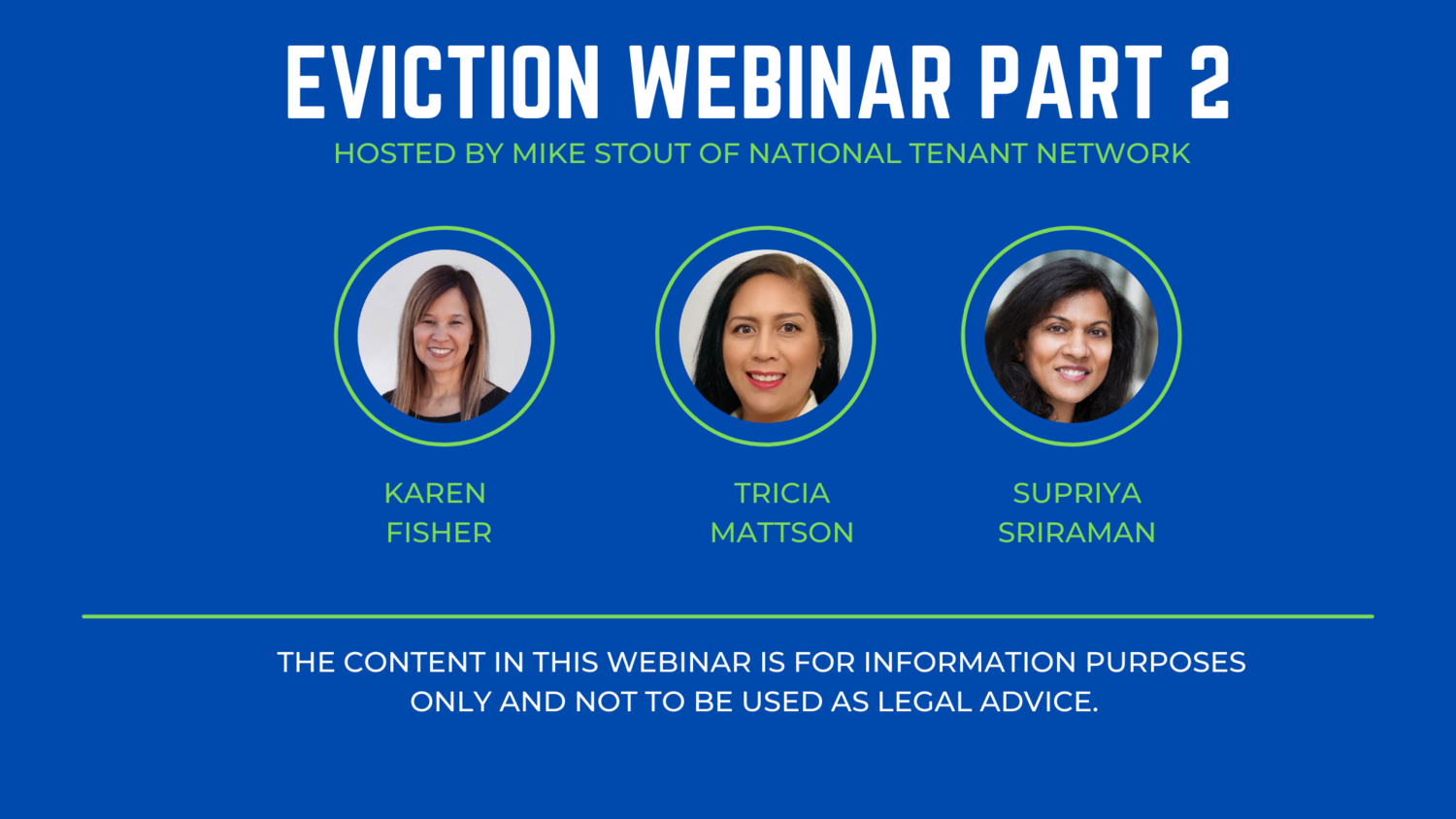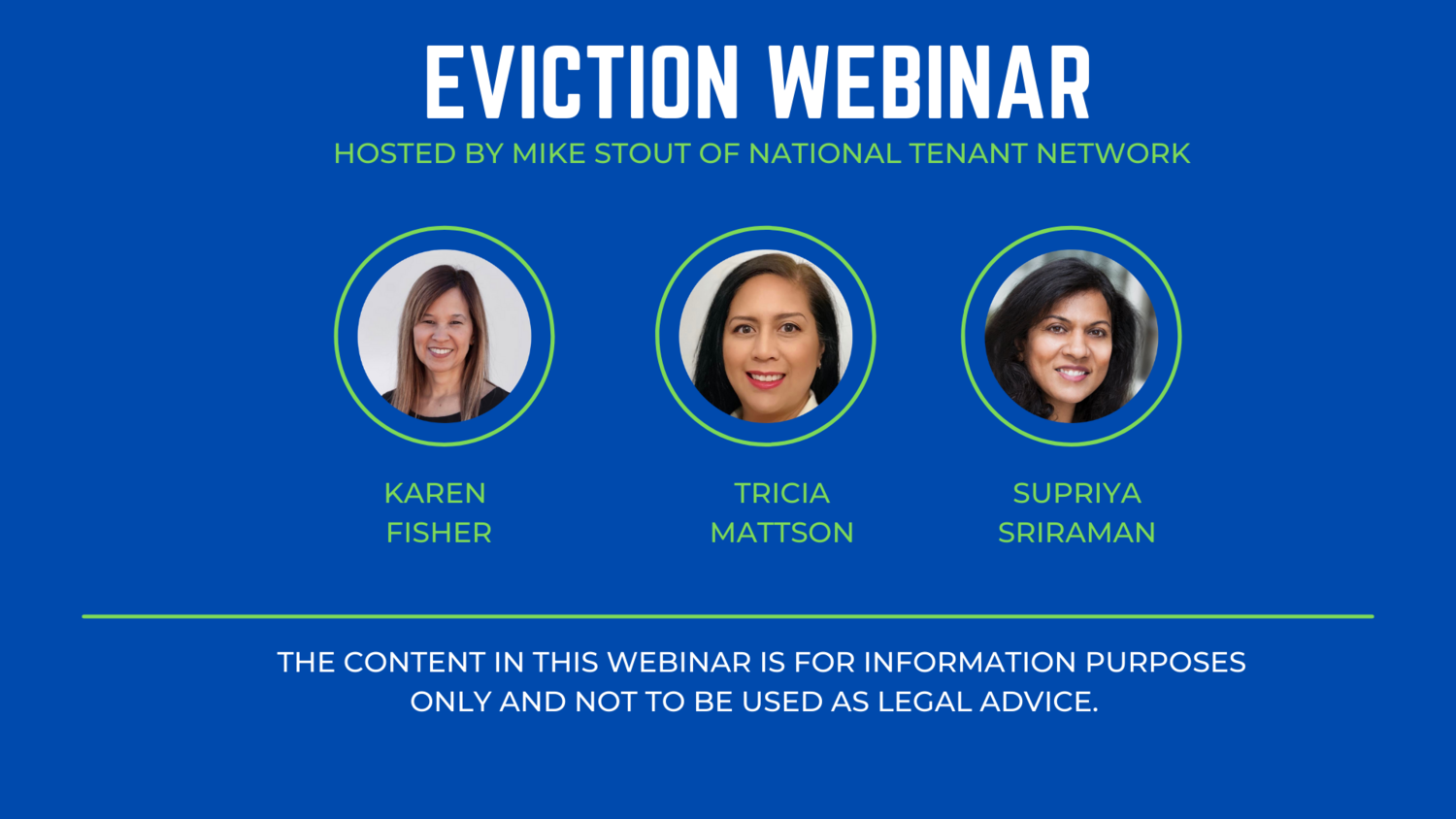
EVICTION WEBINAR PART 2
Mike, Supriya, Tricia, and Karen dive into the tools you need to identify the right tenant and reduce evictions.

Mike, Supriya, Tricia, and Karen dive into the tools you need to identify the right tenant and reduce evictions.

Mike Stout and a guest panel of property experts discuss and answer your questions about the current state of evictions and the latest moratoriums.

Are you ready to move but not quite ready to sell your home? Whether you’re nervous to sell due to the pandemic or eager for a passive income opportunity, converting your home into a rental property can be a smart decision, especially if you use Screening Guy’s screening services to ensure you get the best tenants. However, it’s not always a sure thing. These are three big questions to ask yourself before deciding to become a landlord.
The Screening Guy offers resources to help landlords and property managers ensure they get quality tenants and avoid potential liability. In addition to using our site to find information on landlord-tenant laws, we recommend using True and Verified and the National Tenant Network to find high-quality renters. To learn more about our services, email ScreeningGuy@gmail.com or complete this form.
This is the most important question to ask before making your home a rental property. If you’re not up for the responsibilities of landlordship — or can’t afford them — no amount of passive income will make owning a rental property worthwhile. That includes marketing the property, vetting tenants, handling maintenance and repairs, and upgrading the home. Routine maintenance could include everything from landscaping to HVAC repair to having the gutters cleaned.
There is one alternative for property owners who don’t want the responsibility of landlording: hiring a property management company. Professional property management can make your rental income truly passive by handling landlord duties on your behalf. But first, you need to make sure your property’s rental income potential is enough to cover the mortgage and property management fees.
Passive income is a major draw for homeowners entering the rental marketplace. But are you sure your rental property will generate a profit?
If you own a paid-off home or bought years ago when prices were low, market rate rent may be more than enough to cover expenses and generate income. However, many first-time landlords are caught off guard by the high costs of managing a property. In addition to the mortgage, taxes, and insurance, landlords need to factor maintenance expenses, marketing and management fees, and vacancy rates into their calculations.
Research the local rental market to understand rent prices, vacancy rates, and which areas are popular with renters. If prices are low or the demand isn’t there, you may opt to sell instead. Luckily, there are things you can do to get a great price for your home even in a slow market.
While operating a rental can be costly, landlords get to deduct most expenses including mortgage interest, taxes, insurance, repairs, and depreciation. These deductions offset costs, but keep in mind that you may pay more in insurance and property taxes as an investment owner.
If you sell a rental property within three years of its conversion, you may be able to claim the principal residence gain exclusion, too. However, this tax perk only applies to properties that were used as a primary residence for two of the five years before a sale.
Tax rules for rental properties are complicated, especially when the property was originally used as a primary residence. To understand the tax ramifications of converting your home, read this guide and talk to your tax professional.
You may also want to consider forming an LLC to limit your liability and protect your assets. You can hire an attorney to create an LLC, but you can save by using a formation service.
You’ve decided to take the plunge and rent your home. But now what? Navigating the rental market can be confusing during the coronavirus pandemic. Use these tips to get your property rented quickly and safely:
● Craft a strong listing. High-quality images and a well-written description help your listing stand out and minimize calls from renters who aren’t the right fit.
● Offer video tours. Want to limit in-person tours? Offer walkthroughs via FaceTime or Zoom and limit tours to serious renters only.
● Go paperless. Online background checks and document-sharing tools let landlords screen and sign tenants remotely during the pandemic.
● Offer shorter lease terms. In light of current economic uncertainty, some renters may be willing to pay more for a flexible lease agreement.
If you decide becoming a landlord isn’t for you, don’t wait to sell. Due to low housing inventory, it’s still a seller’s market. However, that could change depending on the course of the pandemic. Rather than trying to time the market, make the move that’s right for you right now.
Image via Unsplash
Article by: Ted James ted@tedknowsmoney.com

Purchasing a second home to rent out can be a great passive investment idea: You buy a house, your renters pay off your second mortgage and you’ll have supplemental income from your tenants’ rent payments. An investment property is real estate that you buy with the intention of earning investment returns through rental income, flipping the home and/or through resale in the future.
Data released by the U.S. Census Bureau in 2017 shows that 47 percent of rentals were owned by individual investors, and rental properties can generate 31 percent of the average landlord’s annual income.
Article Written By Bankrate Staff
Image Credit by https://www.pexels.com/@pixabay

Washington, DC (September 8, 2020) – Today the New Civil Liberties Alliance, a nonpartisan, nonprofit civil rights group, filed a complaint and request for a temporary restraining order or preliminary injunction in the U.S. District Court for the Northern District of Georgia challenging the authority of the Centers for Disease Control and Prevention (CDC) to impose a nationwide “eviction moratorium.” In an unprecedented overreach, CDC issued a “Temporary Halt in Residential Evictions to Prevent Further Spread of COVID-19” order, effective September 4, 2020, “to temporarily halt residential evictions to prevent the further spread of COVID-19.”